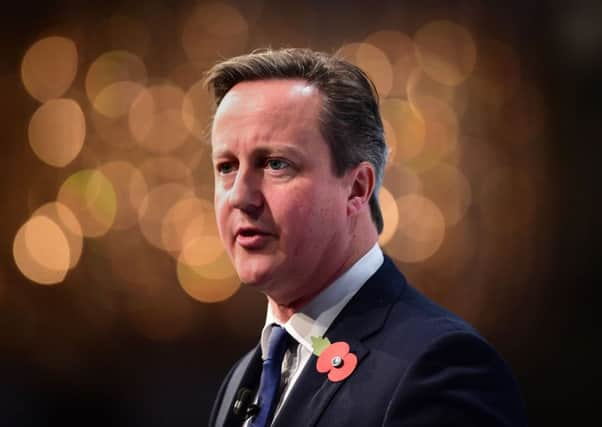David Cameron’s letter to Donald Tusk, President of the European Council


THE PRIME MINISTER 10 NOVEMBER 2015
Dear Donald,
A NEW SETTLEMENT FOR THE UNITED KINGDOM IN A REFORMED EUROPEAN UNION.
Thankyou for inviting me to write setting out the areas where I am seeking reforms to address the concerns of the British people over our membership of the European Union.
Advertisement
Hide AdAdvertisement
Hide AdAs you said, the purpose of this letter is not to describe the precise means, or detailed legal proposals, for bringing the reforms we seek into effect. That is a matter for the negotiation, not least as there may, in each case, be different ways of achieving the same result.
I have been encouraged in many of my conversations with my fellow Heads of Government in recent months that there is wide understanding of the concerns that I have raised, and of the case for reforms that would benefit the European Union as a whole. l particularly appreciate your own personal support throughout.
The European Union has a long history of respecting the differences of its many Member States and of working to overcome challenges in a way that works for the whole European Union.
For example, with the protocols and other instruments agreed for Denmark and Ireland, the EU was able to arrive at a settlement, which worked for each country and did not disadvantage other Member States.
Proposals for reform
1. Economic governance
Advertisement
Hide AdAdvertisement
Hide AdThere are effectively today two sorts of members of the European Union. There are Euro members and none Euro members. As set out in Protocol 15, the United Kingdom has a permament opt-out of the from the Euro-zone. Other countries will join in due course. But for now, there are nine of us outside; and it matters to all of us that the Euro-zone suceeds.
What we seek are legally binding prinicples that safeguard the operation of the Union for all 28 Member States - and a safeguard mechanism to ensure these principles are respected and enforced.
These principles should include recognition that:
- The EU has more than one currency.
- There should be no discrimination and no disadvantage for any business on the basis of the currency of their country.
- The integrity of the single market must be protected.
- Any changes the Eurozone decides to make, such as the creation of a banking union, must be voluntary for non-Euro countries, never compulsory.
Advertisement
Hide AdAdvertisement
Hide Ad- Tax payers in Europe should never be financially liable for operations to support the Eurozone as a country.
2. Competitiveness
The United Kingdom would like to see a target to cut the total burden on business.
The EU should also do more to fulfil its commitment to the free flow of capital, goods and services. The United Kingdom believes we should bring together all the different proposals, promises and agreements on the Single Market, on trade, and on cutting regulation into a clear long-term commitment to boost the competitiveness and productivity of the European Union and to drive growth and jobs for all.
3. Sovereignty
First, I want to end Britain’s obligation to work towards an ‘ever closer union’ as set out in the Treaty. It is very important to make clear that this commitment will no longer apply to the United Kingdom. I want to do this in a formal, legally binding and irreversible way.
Advertisement
Hide AdAdvertisement
Hide AdThe UK will will need confirmation that the EU institutions will fully respect the purpose behind the JHA Protocols in any future proposals dealing with Justice and Home Affairs matters, in particular to preserve the UK’s ability to participate. National security is - and must remain - the sole responsibility of Memebr States, while recognising the benefits of working together on issues that affect the security of us all.
4. Immigration
Britain has always been an open, trading nation, and we do not want to change that. But we do want to find arrangements to allow a Member State like the UK to restore a sense of fairness to our immigration system and to reduce the current very high level of population flows from within the EU into the UK.
We need to ensure that when new countries are admitted to the EU in the future, free movement will not apply to those new memebrs until their economimes have converged much more closely with existing Members States.
As I have said previously, we can reduce the flow of people coming from within the EU by reducing the draw that our welfare system can exert across Europe. So we have proposed that people coming to Britain from the EU must live here and contribute for four years before they qualify for in-work benefits or social housing. And that we should end the practice of sending child benefit overseas.
NEXT STEPS
Advertisement
Hide AdAdvertisement
Hide AdAs we agreed, the details of the reform in each area are a matter for the negotiation itself. But I do hope that this letter can provide a clear basis for reaching an agreement that would, of course, need to be legally-binding and irreversible - and where necessary have force in the Treaties.
I hope and believe that together we can reach agreement on each of these four areas. If we can, I am ready to campaign with all my heart and soul to keep Britain inside a reformed European Union that continues to enhance the prosperity and security of all its Members States.
Yours,
David